CW: white person processing, mention of riots
I first heard Sweet Honey in the Rock perform this song at the inauguration of my college’s first black President, Dr. Ronald Crutcher. Sweet Honey in the Rock performed during the ceremony as did the college’s choir with which I sang. After we performed, I remember their smiles and encouragement as we returned to our seats which were right behind theirs. Then, it was their turn.
“Until the killing of black men, black mothers’ sons, Is as important as the killing of white men, white mothers’ sons.”
I remember feeling a dissonance in my gut as these lyrics rang through the stadium. “Wasn’t this a celebratory day and a celebratory event? Weren’t we celebrating that a black man was president, why did they pick to sing a song that brings up murder.”
This was not the first time, nor the last, when my privilege and whiteness would feel that dissonance as it encountered racism and white supremacy and its daily effect on the lives of my siblings of color.
The election of Dr. Crutcher as our college’s president didn’t wash away the racism and white supremacy that permeated my beloved alma mater. Were Sweet Honey in the Rock trying to let me and my white siblings know that they knew this and were calling us to attention? Perhaps.
“We who believe in freedom cannot rest, We who believe in freedom cannot rest until it comes.”
The month of June is celebrated around the world as Pride month because it was in the early hours of June 28th, 1969 that queer folk — specifically queer folk of color like Marsha P Johnson and Stormé DeLarverie — took a stand against the New York Police Department who were raiding one of their sanctuaries — the Stonewall Inn, a gay bar — and arresting its patrons.
What followed was a week of riots, rebellion, confrontation, and destruction of property which gave life to the Gay Liberation Front and a movement for the rights of the LGBTQIA+ community in New York City and beyond.
My ability to live openly as a queer woman and to be legally married to my wife without losing my job and livelihood is due, in large part, to those first moments of riot, rebellion, confrontation, and destruction of property.
Pride today is celebrated with parades, rainbows, and often PRIDE worship services led by the very religious communities that once shut their doors to our community. It is a time of joy.
“Until the killing of black men, black mothers’ sons, Is as important as the killing of white men, white mothers’ sons.”
The dissonance experienced by these lyrics — is yet again — within me and our community.
This year’s Pride is not a time of joy — it is a time of anger, mourning, and remembering that our community’s journey toward justice was ignited at the hands of our black LGBTQIA+ siblings who are, once again, rioting, rebelling, confronting, and destroying property to declare their lives matter.
Let not the Pride flag — with all its symbolism of “welcome” — be put to shame by being waved this month in ignorance of our siblings’ suffering. Let us acknowledge as Emma Lazarus, the Jewish-American poet, so poignantly wrote that “Until we all are free, we are none of us free.”
During the months of June and July, ELM has asked members of Proclaim to use our blog as a space for Pride Devotionals: songs that have inspired action, spiritual awakening, tied to an unforgettable moment, associated with captivity/freedom, Pride. We are specifically asking all of our writers to acknowledge the intersectionality of identities that remind us that seeking justice in a silo — a queer-only focus — ignores and dishonors the great diversity of bodies, minds, abilities, genders, and orientations with which God has blessed us.
Let us pray…
Oh great Mystery, whose Word sparked all things into being at the start of creation, bless the words and actions of our community. May your Spirit — who toppled towers when humanity thought itself too proud, and parted the seas to liberate your people from the death-dealing ways of empire — convict us to act on behalf of our neighbor for the sake of your Kin-dom. And, may we who believe in freedom not rest until it comes. Amen.
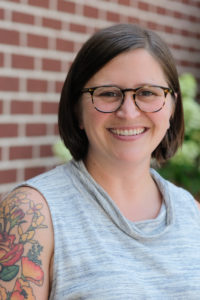 Amanda Gerken-Nelson (she/her/hers) believes black lives matter and is educating and training herself to dismantle the white supremacy and racism that has scared and paralyzed her in the past at the expense of her siblings of color who have experienced great harm. She seeks to be an ally and — in the words of long-time ELM supporter, Margaret Moreland — an accomplice in the movement to eradicate racism and white supremacy in ELM, the Church, and society.
Amanda Gerken-Nelson (she/her/hers) believes black lives matter and is educating and training herself to dismantle the white supremacy and racism that has scared and paralyzed her in the past at the expense of her siblings of color who have experienced great harm. She seeks to be an ally and — in the words of long-time ELM supporter, Margaret Moreland — an accomplice in the movement to eradicate racism and white supremacy in ELM, the Church, and society.

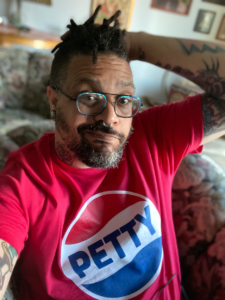 Rev. Lenny Duncan (he/him) is a mission Developer in the #PNW and likes to think he is a writer.
Rev. Lenny Duncan (he/him) is a mission Developer in the #PNW and likes to think he is a writer.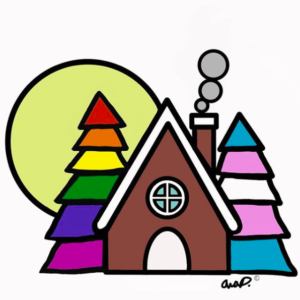
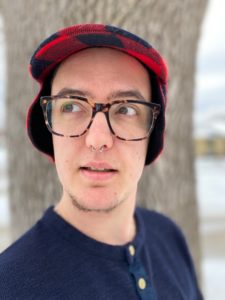 Drew Stever (they/he) is in his final semester of his Master of Divinity studies at Luther Seminary. Originally from St. Paul, MN, he is currently located in Southern California. Two of the greatest purchases he has ever made in an attempt to deal with COVID-19 is rice pudding and a pink onesie.
Drew Stever (they/he) is in his final semester of his Master of Divinity studies at Luther Seminary. Originally from St. Paul, MN, he is currently located in Southern California. Two of the greatest purchases he has ever made in an attempt to deal with COVID-19 is rice pudding and a pink onesie.  Rev. Susan Halvor (she/her/hers) has lived in Anchorage, Alaska for 20 years, after being raised in the Pacific Northwest. She will celebrate the 20th anniversary of her ordination to Word and Sacrament ministry in August. Her heart is most alive in the holy moments of hospital chaplaincy. She currently manages the spiritual care department at Providence Alaska Medical Center, and spent 11 years as the Children’s Hospital Chaplain. She and her partner Holly look forward to the days they can travel again, and in the meantime, are grateful to live in a place where they can look forward to hiking, fishing and backpacking this summer.
Rev. Susan Halvor (she/her/hers) has lived in Anchorage, Alaska for 20 years, after being raised in the Pacific Northwest. She will celebrate the 20th anniversary of her ordination to Word and Sacrament ministry in August. Her heart is most alive in the holy moments of hospital chaplaincy. She currently manages the spiritual care department at Providence Alaska Medical Center, and spent 11 years as the Children’s Hospital Chaplain. She and her partner Holly look forward to the days they can travel again, and in the meantime, are grateful to live in a place where they can look forward to hiking, fishing and backpacking this summer. Early on, I identified leaders: we started with Street Shepherds, and then added the role of Guardians. Street Shepherds check on everyone on the street and communicate needs back to me, then we reach out to the wider community when appropriate. They offer support, friendship, and care, and remind us that we are a family. Our Guardian is a supporting, protecting, defending presence, offering wisdom and counsel as we navigate the streets and ministry. The act of drawing in and building up leaders from the margins is a gift of my Queerness–which apprehends value where the world doesn’t always. Queerness has eyes to see, from the margins and from its own experience of alienation, the difference between a theology of glory, which calls things what they aren’t—calling the good bad, and the bad good—and a theology of the cross, which calls things what they really are. As a Queer transgender Christian, I am witness to a theology of the cross.
Early on, I identified leaders: we started with Street Shepherds, and then added the role of Guardians. Street Shepherds check on everyone on the street and communicate needs back to me, then we reach out to the wider community when appropriate. They offer support, friendship, and care, and remind us that we are a family. Our Guardian is a supporting, protecting, defending presence, offering wisdom and counsel as we navigate the streets and ministry. The act of drawing in and building up leaders from the margins is a gift of my Queerness–which apprehends value where the world doesn’t always. Queerness has eyes to see, from the margins and from its own experience of alienation, the difference between a theology of glory, which calls things what they aren’t—calling the good bad, and the bad good—and a theology of the cross, which calls things what they really are. As a Queer transgender Christian, I am witness to a theology of the cross.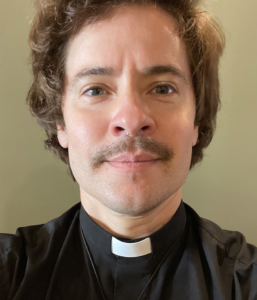 Atticus Zavaletta (he/they) is a Street Minister at North Ave Mission and Vicar at Amazing Grace Lutheran Church in Baltimore, MD.
Atticus Zavaletta (he/they) is a Street Minister at North Ave Mission and Vicar at Amazing Grace Lutheran Church in Baltimore, MD.  Mark Erson – (he/him/his) serves St. John’s Lutheran Church in Greenwich Village, Manhattan, NY, as pastor. He is also a theatre artist and award-winning playwright. He is most excited and looking forward to working with Reed Noel on their internship in the coming year.
Mark Erson – (he/him/his) serves St. John’s Lutheran Church in Greenwich Village, Manhattan, NY, as pastor. He is also a theatre artist and award-winning playwright. He is most excited and looking forward to working with Reed Noel on their internship in the coming year. We seek community, affirmation, and practice what self-care we can to empower our faltering nerves and exited stumblings. Through it all, the Savior is ever-present, known and unknown, leaving signs for when we are ready to receive them. Beginning with Easter, not ending, we go boldly into the new and unknown, as seekers and receivers. We know we will most certainly miss the face of Jesus when we are grieving or scared, confused or lonely. Jesus will still be there. We will still be loved. God will still, without fail, be working.
We seek community, affirmation, and practice what self-care we can to empower our faltering nerves and exited stumblings. Through it all, the Savior is ever-present, known and unknown, leaving signs for when we are ready to receive them. Beginning with Easter, not ending, we go boldly into the new and unknown, as seekers and receivers. We know we will most certainly miss the face of Jesus when we are grieving or scared, confused or lonely. Jesus will still be there. We will still be loved. God will still, without fail, be working.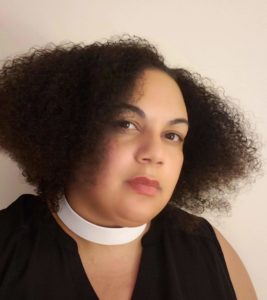 The Rev. Carla Christopher Wilson (she /her/hers) is a redevelopment pastor serving a congregation in Lancaster, PA. Also the co-chair of Lower Susquehanna Synod’s Racial Justice Task Force, Carla is a queer femme Black (and a little Latinx) warrior for justice and equity. A former Poet Laureate of York, PA and a published writer, Carla is passing her quarantine time writing Triduum poetry and cuddling her puppies.
The Rev. Carla Christopher Wilson (she /her/hers) is a redevelopment pastor serving a congregation in Lancaster, PA. Also the co-chair of Lower Susquehanna Synod’s Racial Justice Task Force, Carla is a queer femme Black (and a little Latinx) warrior for justice and equity. A former Poet Laureate of York, PA and a published writer, Carla is passing her quarantine time writing Triduum poetry and cuddling her puppies. Jon Rundquist (he/her/theirs) is a lover of Holy Week, a parent and a spouse, and 2017 MDiv. graduate of Luther Seminary. She’s worked at Target on and off since the end of internship, awaiting her own “what comes next”.
Jon Rundquist (he/her/theirs) is a lover of Holy Week, a parent and a spouse, and 2017 MDiv. graduate of Luther Seminary. She’s worked at Target on and off since the end of internship, awaiting her own “what comes next”.